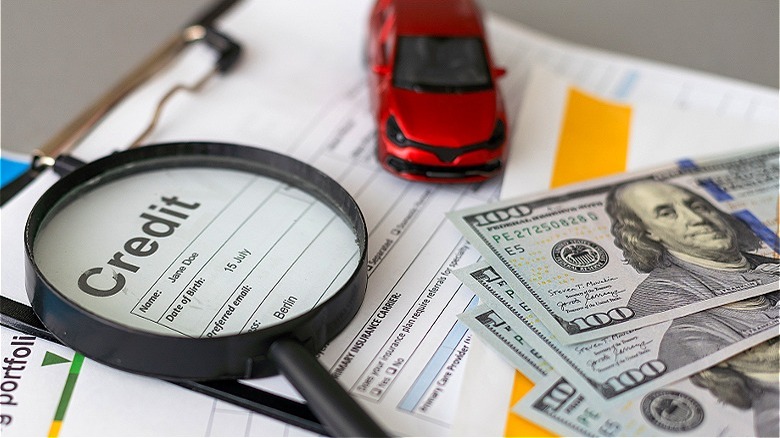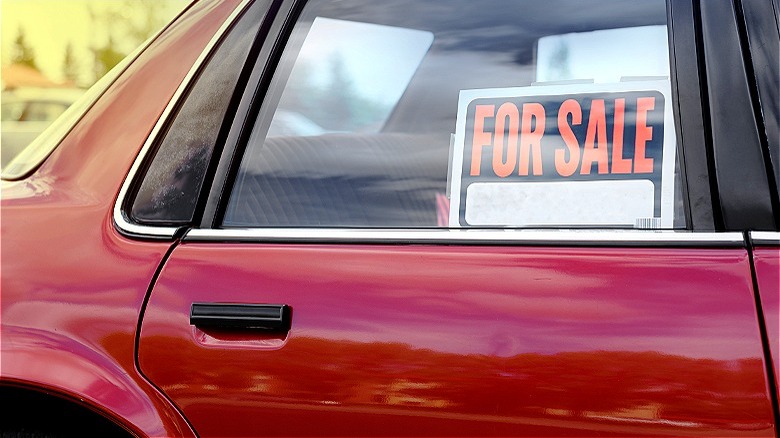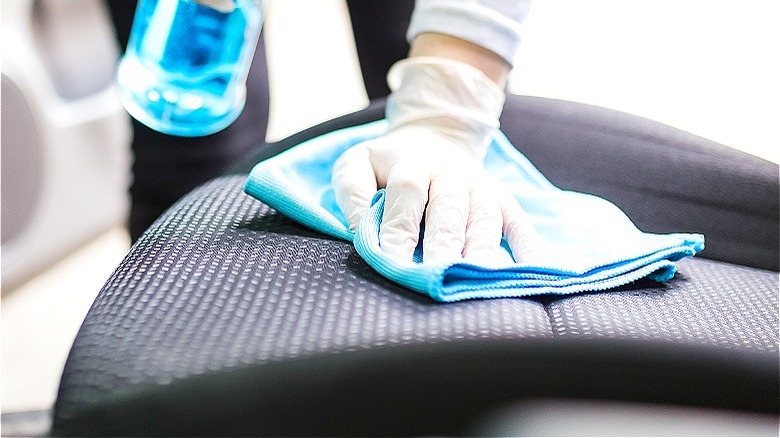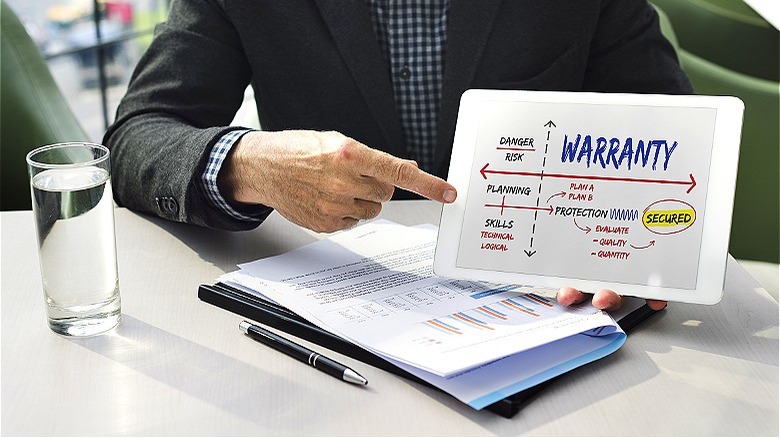Sneaky Ways Car Dealers Trick You Into Spending More Money
If you haven't been new-car shopping for several years, then you should prepare for sticker shock. For February 2024, the average price of a new car stood at a whopping $48,763, according to data from Kelley Blue Book. That was up from an average price of $38,948 to end 2019 — prior to the COVID-19 pandemic years and the resultant rampant inflation.
Regular Money Digest readers will know that we recommend against purchasing a brand new car. Instead, you might consider buying a slightly used car, with a sale price that reflects the fact the car has already depreciated in value somewhat. This said, there are occasions when buying a new car makes sense, such as certain vehicles that maintain an abnormally high resale value.
The bottom line is that whether you decide to buy new or used, you'll want the best deal possible. That's not always easy since the average American buys a car every five to eight years, according to a recent study by car insurance provider The Zebra. Compare that to the considerable experience of car salespeople and other dealership staff who go through the process multiple times per day, and you'll find occasional car buyers at a serious disadvantage when it comes to negotiating price. Yet, doing a little homework in advance of visiting a local car dealership can go a long way in helping to avoid some of the common tricks dealerships play to get you to spend more.
Offering noncompetitive interest rates
Nearly 80% of all new vehicles are bought using financing, per Experian's State of the Automotive Finance Market Q4 2023 report, and this financing is often arranged by the selling dealership. Before you set foot in a new or used car dealership, be sure to check your credit score. It's also a good idea to research the auto loan interest rates available to you from local banks or credit unions, as well as online lenders.
Some particularly unscrupulous dealers will imply that your credit score is low — even if it's not — necessitating a higher interest rate on your auto loan. Car dealerships will typically earn extra money if they're able to convince you to accept a higher interest rate, so you'll want to know if your credit score is indeed bad. Other dealerships with higher moral values might not specifically lie about your credit score, but they also won't be forward about offering the best (lowest) interest rates up front, hoping you'll be satisfied with a higher rate than you might otherwise be entitled to.
To counter such sneaky dealership tactics, research auto loan interest rates beforehand and don't be afraid to use this information as a bargaining chip to negotiate better loan terms. If the car dealership isn't willing to match the best interest rates you've located, then make good on your ultimatum to obtain the loan yourself.
Asking about monthly payment
Frequently, a conversation with a new car salesperson will begin with the question of how much a buyer can afford to pay a month. Focusing exclusively on this single variable allows the salesperson to obscure other facets of the transaction, like the purchase price of the vehicle, interest rate, and the term (duration) of the loan. If you encounter this particular car dealership tactic, tell the salesperson you're not ready to talk about financing yet and want to learn more about the vehicle first. The goal is to negotiate the purchase price of the car first and foremost, then move to discuss financing that already-negotiated amount.
This advice isn't to say that a monthly car payment shouldn't be considered, because it should. For example, if you can only afford to pay $400 per month, you shouldn't be looking at $70,000 vehicles — no matter how good your negotiating skills or how attractive the interest rate is. Smart shoppers will use an auto loan calculator to determine a realistic price range based on a monthly car payment that's affordable. Just don't share that monthly payment parameter with your salesperson, lest the other aspects of the purchase will be quickly muddied.
Finally, experts recommend against taking out auto loans with terms longer than 60 months. Why? Though the payments for longer loans, like 84 or 96 months, will seem lower, you'll actually wind up paying more in interest over the course of the loan. Plus, the potential for getting "upside down" — owing more on the car than it's worth — is greater with longer loans.
Manipulating the value of your trade-in
Similar to how a new car salesperson will ask how much per month you can afford to pay, they'll also be quick to ask about the car you're trading in. Assuming you do own a vehicle that you'll want to sell or trade, keep that information to yourself early in the negotiating process. For example, if a salesperson knows that receiving a certain amount for your trade-in is important to you, they can hit that number at the expense of overpricing the new vehicle. Conversely, you might be offered a great price on the purchase of your new vehicle, but receive less than market value for your trade-in. For these reasons, it's best to keep these two halves of the transaction separate for as long as possible.
Additionally, it's always a good idea to value your car's trade-in beforehand. Car price guides, like Kelley Blue Book, have existed for eons, but a better method is to get an online appraisal from a used automotive business like CarMax or Carvana. They'll actually purchase your vehicle for the quoted price, not merely give an opinion of value.
If the car dealership you're purchasing from won't match other offers, you're always free to sell to those other parties instead. With this said, be sure to factor in any sales tax savings from buying and trading in the same transaction with a single business. In several states, trade-in value is deducted from the new car price when determining the cost basis for sales tax.
Adding on questionable extras
For decades, extras like paint coatings, fabric protection, nitrogen-filled tires, or window etching (to protect against theft) have been a lucrative (and sneaky tactic) for auto dealerships to make additional profit from each sale. Many of these car treatments have questionable benefits to begin with, but if you're still intent on doing them, it'll be way less expensive to source on your own.
For example, a can of the industry standard Scotchguard fabric protector sells for less than $15 at big-box and hardware stores compared to hundreds of dollars that car dealerships charge. Similarly, dealers tout that filling your tires with nitrogen instead of regular air will reduce fluctuations in air pressure. However, the reality is that this practice is derived from race cars, meaning your street- driven car will see little benefit. This said, if you really want nitrogen in your tires, certain auto repair shops will accommodate your request for $5 to $10 per tire, not $200.
Some dealerships may be unwilling to remove the charge for these extra-cost items, claiming that they're already installed. In other cases, the cost may be permanently printed on the sales contract — with no option to remove it. In those instances, you can suggest the purchase price of the vehicle be lowered by a commensurate amount to match the dubious add-on(s). However, such add-ons have become so pervasive of late that you might need to be willing to accept them if the overall deal, including the extras, is better than what competing dealers are offering.
Pitching extended warranties or service contracts
Once you're past the hurdle of getting you to spend more on dubious dealer-installed extras, you'll meet with the car dealership's financing and insurance department (or business department), where the battle to defend yourself from overpaying for your chosen car will continue. Besides negotiating loan terms, assuming that you require one, this employee will attempt to sell a litany of other items. These services can include tire damage protection, extended warranties, service contracts (for oil changes and the like), extra insurance coverage, and more.
That is not to say that none of these products are legitimate, but, like with fabric protection and nitrogen tire fills, the dealership is offering them to you at a tremendous markup. Also, with regard to an extended warranty, you probably don't need to decide about purchasing one right away. That's because new cars are covered by a manufacturer warranty for at least a few years. After it expires, then you can always opt to get an extended warranty; but you might choose to sell or trade in the vehicle instead, or self-insure against repairs, negating the need for an extended warranty.
Often, you'll be presented with several different policies to select from, with no option to decline altogether. Not wanting to be confrontational, some car buyers will simply select the least-expensive alternative, but you should stand firm and decline the recommendations instead. While doing so might create a moment of awkwardness, it's your hard-earned money that's being protected.





